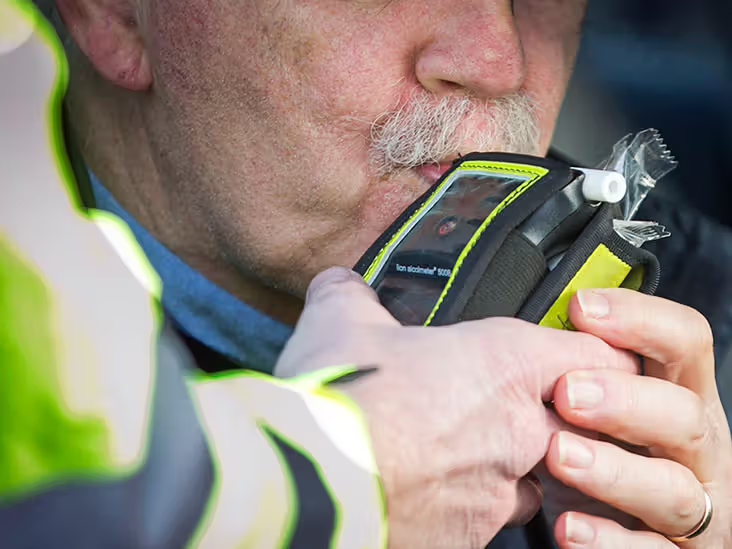What Happens If You Refuse a Breathalyzer Test During an OUI Stop in Massachusetts?
Getting pulled over on suspicion of operating under the influence (OUI) in Massachusetts is stressful enough, but refusing to take a breathalyzer test can add another layer of legal trouble. While many drivers assume saying “no” might help their case, the reality is more complicated.
Let’s walk through how breathalyzer refusal works under Massachusetts law, what penalties you could face, and how an experienced attorney can help you navigate both the RMV and the courtroom.
What Is the Implied Consent Law in Massachusetts?
The implied consent law says that if you’re driving on Massachusetts roads, you have tacitly given your consent for sobriety testing.
How Does Implied Consent Affect Drivers?
Implied consent affects drivers by requiring them to submit to chemical testing if they’re lawfully arrested for OUI.
Under Massachusetts law, the moment you drive on public roads, you’ve given your implied consent to submit to a chemical test (typically a breathalyzer) if police suspect you of operating under the influence. This is outlined in Massachusetts General Laws Chapter 90 §24(1)(f)(1).
Refusing the test doesn’t mean you avoid consequences. Instead, it immediately triggers an administrative license suspension, regardless of whether you’re later found guilty in court.
What Are the Legal Foundations of This Law?
The legal foundation of breathalyzer refusal penalties lies in M.G.L. c. 90 §24(1)(f)(1).
This statute empowers the Massachusetts Registry of Motor Vehicles (RMV) to suspend your license for refusing a chemical test, even if you’re ultimately acquitted of the OUI. The goal is to encourage compliance with roadside sobriety testing and streamline enforcement of impaired driving laws.

What Are the Penalties for Refusing a Breathalyzer Test?
Refusing a breathalyzer test usually means a license suspension, but the duration depends on different factors.
How Does Refusal Impact License Suspension?
Refusing a breathalyzer test results in an automatic license suspension, with the duration based on your prior OUI history:
- No prior OUI offenses: 180-day suspension
- One prior OUI offense: 3-year suspension
- Two prior offenses: 5-year suspension
- Three or more: Lifetime license suspension
These are administrative suspensions, enforced by the RMV and separate from any criminal penalties.
Are There Additional Consequences?
Yes. In addition to the license suspension, refusing a breathalyzer can lead to:
- Immediate license confiscation
- Vehicle impoundment for at least 12 hours
- Loss of eligibility for hardship license (in some cases)
These penalties begin immediately, even before you’re arraigned in court. And unlike criminal convictions, these administrative consequences kick in without needing a guilty verdict.

How Does Refusal Affect Your Criminal OUI Case?
Refusal can affect your OUI case in several ways, including being admitted as evidence against you.
Can Refusal Be Used as Evidence in Court?
Yes. While refusing a breathalyzer is not a crime itself, prosecutors can introduce the refusal as evidence that you were conscious of guilt.
In other words, the fact that you refused the test might be used to argue that you knew you were intoxicated and were trying to avoid proof of it.
Judges and juries don’t always accept this argument, but it can influence how your case is perceived.
Does Refusal Prevent OUI Charges?
No. Refusing a breathalyzer does not prevent the Commonwealth from pursuing an OUI case.
Prosecutors can still rely on:
- Field sobriety tests
- Officer observations (slurred speech, glassy eyes, etc.)
- Video footage from body cams or dash cams
- Witness testimony
So, while you’re avoiding one piece of evidence, you’re not avoiding the charge altogether.
What Are the Penalties for Drivers Under 21?
Drivers under 21 face significant license suspensions.
How Does Refusal Impact Underage Drivers?
Underage drivers who refuse a breathalyzer face even steeper consequences.
If you’re under 21, a first-time breath test refusal results in:
- A 3-year license suspension under the implied consent law
- An additional 180-day suspension under the Junior Operator Law
That’s a total of 3.5 years without a license before your case even goes to trial.
What Is the Youth Alcohol Program (YAP)?
What is the Youth Alcohol Program (YAP)?
The Youth Alcohol Program (YAP) is a court-approved alcohol education program for drivers under 21.
Completing the YAP may reduce suspension periods for some underage drivers, but eligibility varies depending on the nature of the charge and RMV policy. Enrolling in the program early can demonstrate accountability and potentially help with future license reinstatement.
Can You Appeal a Breathalyzer Refusal Suspension?
Yes, you can, but you need to act fast.
What Is the Appeal Process?
You can appeal a breathalyzer refusal suspension, but the clock starts ticking fast.
You have 15 calendar days from the date of your arrest to request a hearing with the RMV. This hearing is held at the Boston (Haymarket) RMV Service Center, and it’s your only chance to challenge the suspension before it takes effect.
Missing this window means automatic suspension, with no exceptions.
What Is the Appeal Process?
To win an appeal, you’ll need to prove at least one of the following:
- Lack of probable cause for the OUI arrest
- Failure to inform you of the consequences of refusal
- Not being placed under arrest before the breathalyzer was requested
These hearings are administrative, not criminal, and the burden of proof is low, so legal representation is very important.

Is a Hardship License Available After Refusal?
Yes, a hardship license is available after refusal, but it’s not the same as a standard license.
What Is a Hardship License?
A hardship license allows you to drive for specific, essential purposes, like commuting to work, attending medical appointments, or getting to court-ordered treatment.
It doesn’t restore full driving privileges, but it can be a lifeline during suspension periods.
How Can One Obtain It?
Eligibility for a hardship license depends on several factors:
- Number of prior OUI offenses
- Completion of required programs, such as the 24D First Offender Program or YAP
- Proof of hardship, including employment or medical documentation
- Compliance with waiting periods, which may range from several months to over a year depending on your history
Your attorney can help you gather documentation and prepare a strong case before your RMV hearing.
How Can Attorney Darren Griffis Assist You?
Attorney Darren Griffis has worked with many clients charged with OUI and who have refused the breathalyzer test.
What Expertise Does Attorney Griffis Offer?
Attorney Darren Griffis has extensive experience representing clients charged with OUI in Worcester County, including those who refused a breathalyzer test.
He understands how refusal cases unfold, both in RMV administrative hearings and criminal court, and has helped clients avoid long-term license suspensions and minimize criminal exposure.
How Does Legal Representation Benefit Your Case?
Breathalyzer refusal cases involve two separate proceedings: the administrative license suspension and the criminal OUI charge.
An experienced attorney like Darren Griffis can:
- Represent you at your RMV appeal hearing
- Challenge the legality of the arrest
- Argue for exclusion of the refusal evidence
- Negotiate for hardship licenses
- Fight to reduce or dismiss the criminal charge altogether
In Worcester and surrounding towns, a local defense lawyer can make a big difference in how your case is resolved.
FAQ
Can I refuse a breathalyzer test without legal consequences?
No. Refusing a breath test triggers immediate license suspension and can be used against you in court.
How long will my license be suspended if I refuse the test?
These conditions can be used as part of your de
It depends on your record:
- 180 days for the first offense
- 3 years for the second
- 5 years for the third
- Lifetime for four or more
fense. Be sure to tell your attorney and provide any medical documentation.
Does refusal guarantee a better outcome in my OUI case?
Not necessarily. While it removes one piece of evidence, it doesn’t stop prosecutors from pursuing a conviction.
What steps should I take immediately after refusing a breathalyzer?
- Contact an OUI defense attorney
- Request an RMV hearing within 15 days
- Gather any evidence or witness names
- Stay off social media
Can I get my license reinstated before the suspension period ends?
Possibly. You may qualify for a hardship license or, in some cases, reduced suspension periods by completing treatment or education programs.
If you refused a breathalyzer test during an OUI stop in Worcester or nearby towns, time is not on your side. The RMV moves quickly, and your rights can slip away before your court case even begins. Contact a qualified defense attorney right away to preserve your options and build the strongest case possible.

About the Author
Darren Griffis is a top-rated criminal defense attorney with a proven track record of success defending the rights of his clients in the Worcester area and throughout the Commonwealth of Massachusetts. Attorney Darren Griffis focuses his litigation practice on criminal defense and criminal appeals in both state and federal courts throughout Massachusetts. In addition to this litigation practice, Darren T. Griffis also assists college students who are facing university disciplinary proceedings for alleged violations of student codes of conduct, including allegations related to sexual misconduct.